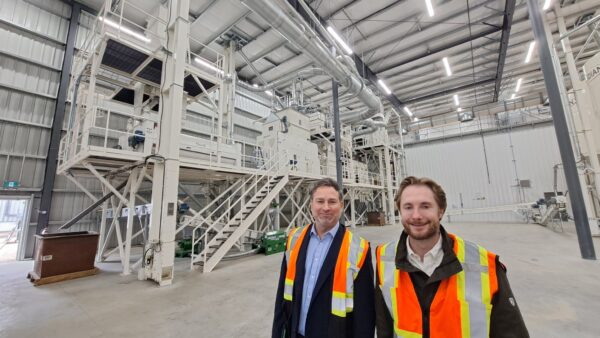Jacob Ware, the chair of ASTA’s Leadership, Education and Development Committee, says a lot of rides on mentorship and intentional leadership.
Jacob Ware is a business manager for HM.CLAUSE. He manages a product development and sales team spread across the United States and Canada. He is also the chair of ASTA’s Leadership, Education and Development (LEAD) Committee. We sat down with Jake to talk about mentorship, leadership… and sailing too.
Seed World: How long have you been part of the seed industry?
Jacob Ware: I started in 2012, so about 11 years. Prior to that, I was working in an environmental field. I studied economics with a minor in business. Everybody always thinks ag economics but, no, I studied straight economics. I come from a family of farmers and my father is in the seed industry. I wasn’t going to be in agriculture — I was going to do my own thing —but [agriculture] definitely has a way of pulling you into it.
SW: Over the years, you’ve taken on more and more leadership roles. Now you’re also in leadership with ASTA as well. Did you have mentors along the way who supported your professional development?
JW: I’ve been lucky to have some very, very good mentors both within HM.CLAUSE and outside of it. One in particular would be an old boss of mine who really helped me develop in my career, both when I was working for her and beyond. Why her mentorship has been so valuable is that she’s a good listener, she truly cares, and she asks amazing questions that really get to the core of a problem. She also knows me quite well. She’s one of those people who it can seem knows you better than you know yourself because they start to dig into things that you didn’t think of. That can be tremendously helpful.

SW: The intentionality of how she has supported you is important to the whole seed sector. Can you talk more broadly about intentional leadership within this sector?
JW: I think leadership is important in any sector. Incredibly important. I have a table in my office that has turned into a puzzle table for my daughters. There’s a similarity there, when I think of that question, in the sense that you can have all the pieces that are right for a company to be successful, but I think it’s intentional leadership that really helps put those pieces together and create something. How [good leaders] do that is by having a vision, getting people pointed in the same direction, and really understanding their people, making sure that their people are in the right places and moving in the right direction. I think that with intentional leadership and a good, strong vision, not only can we be successful, but people really enjoy what they do. When they’re enjoying what they do, for one, it’s more fun. For two, people seem to do more; they seem to be more successful.
SW: Twelve years into the industry, what kind of advice would you give people who are just getting started in leadership or looking to improve their leadership skills?
JW: I think curiosity and being a constant learner is one of the most important aspects. I love to read. There’s so much content out there on leadership. I’ve been reading a lot of Ryan Holiday lately. He focuses on stoicism. But also Simon Sinek, David Goggins, Tim Keller, Carnegie, Lencioni, Gladwell, Covey. They’re all coming from very different perspectives. If you’re not an avid reader, that’s fine. Audible is great. Podcasts are great, YouTube: all of these people are providing content in that way.
I think the other thing is to try things. Try these different leadership skills. Try a project that you’ve read somewhere, and you want to bring to your team. There’s a little bit of vulnerability involved there but I promise that, even if it’s not a success and you continue to try and find your way, I think people really respect that over time. And they really appreciate the genuine aspect that you’re trying to improve things, really trying to improve these people’s lives and ultimately improve the success of the team that you’re leading.
And lastly, it’s just a shameless plug, I know, but attend the ASTA Leadership Summit. The LEAD committee that I chair, we put a lot of work into it. There are so many people throughout ASTA that put a lot of work into it. This is a fantastic way for a company to not only give your people some solid leadership training, but it’s based around the seed industry. As a seed company, how could that really be any better? You’re able to network, understand the industry as a whole and get leadership training that’s really catered towards our industry.
SW: When you’re not busy with work, what do you spend your time doing?
JW: When I was younger, I worked at a backpacking shop and we did a lot of backpacking, snowboarding and stuff like that. That progressed into more camping with my wife, which turned into like sea kayaking with my kids as they got older. We’ve gotten into some pretty gnarly situations in the kayaks and we thought: it’s that old Jaws line: we’re gonna need a bigger boat. I picked up sailing about four years ago and I’m just fully obsessed with it now. If I’m not working or with my family, I’m sailing, and a lot of times I’m sailing with the family.To see Jacob’s entire Q&A interview, watch the video here:











